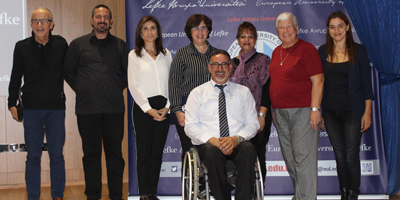“The Role of NGOs in establishing Policies and Legal Regulations” discussed at EUL
European University of Lefke (EUL) Education and Research Center for Children with Special Needs (ÖÇEM) organized a panel themed “The Role of the Non-Governmental Organizations (NGO) in establishing Policies and Legal Regulations”. Güliz Kaner, Head of Association for Supporting Accessible Life; Refia Arı, Head of Association for the Solidarity of Disabled Families; Mustafa Özerdem Head of Hope Association of Autism; Günay Kibrit, Cyprus Turkish Orthopedic Disability Association; and Melek Çaluda Head of Turkish Cypriot Mentally Handicapped Association attended the panel as speakers.
Panel was held with two sessions
In the panel, which was held with two sessions, the NGO representatives gave detailed information about the organizations, structures and activities of the NGOs.
Günay Kibrit, Cyprus Turkish Orthopedic Disability Association said that their association was established in 1988 with the aims of; determining the physical disabled people based in the T.R.N.C; carrying out their legal representation; working in line with the principle of equalization of availability; solving problems; providing material and moral support; training and rehabilitation; creating public opinion; providing medical supplies requirements; ensuring that legal regulations and standards are adopted and settled in our country; ensuring the integration of people with disabilities into society and explained the activities they have been carrying out since the establishment date.
Güliz Kaner, Head of Association for Supporting Accessible Life gave information about their Accessible Home project which aims to ensure a home to the people with disabilities over the age of 18 where they can live without care their of their families; the phases of the project; and how will the project work under the body of TRNC Social Services Office. Pointing out the aim of the project as; creating an environment in which different developing individuals can live safely, develop social adaptation skills and business skills, Kaner said that “Our aim is to ensure that individuals with disabilities have cultural activities in a safe environment and to strengthen their participation in society”. Kaner also stated another aim of the Accessible Home as; with the help of protective workshops, supporting their participation to the work life and ensuring that they take place in the society as productive individuals which will increase their self-confidence.
Melek Çaluda Head of Turkish Cypriot Mentally Handicapped Association pointed out the aims of the association as; meeting the needs of the mentally handicapped; conducting studies to establish a fully equipped rehabilitation center; ensuring that the mentally disabled people whose family has died are protected by the government and explained their sponsored donations to different special education centers.
Mustafa Özerdem, Head of Hope Association of Autism pointed out their aims of establishment as overcoming the difficult conditions of families in relation to children with Autism Spectrum Disorder and providing inclusive education to them and requested help from all voluntary agencies.
Refia Arı, Head of Association for the Solidarity of Disabled Families pointed out that they are the oldest established NGO in the T.R.N.C and said that most important thing is the lack of knowledge of the families about their children. She also said that families should collaborate and NGOs will be stronger if they gather up under a confederation.
In the second session of the panel role and place of NGOs in establishing policies and regulations for people with disabilities was discussed and it was determined that if the NGOs collaborate establishing policies would be easier. Finally the importance of providing the families of all disabled individuals with family education primarily and especially by the EUL special education department was emphasized under the framework of the panel.
The panel ended after the questions of the students.

